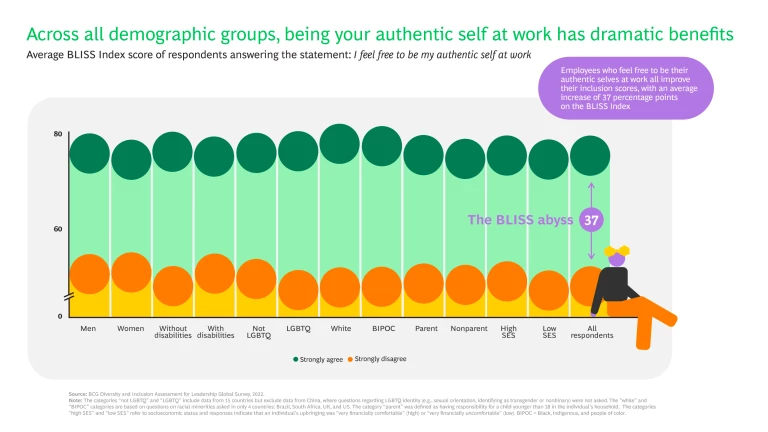Improving employees’ experience of inclusion in the workplace is one of the most actionable levers companies have to attract and retain talent. When done right, inclusion can slash attrition risk in half.
In today’s fiercely competitive environment, inclusion is akin to a hidden superpower, so why do so few companies view it as a business necessity? The answer is simple: workplace inclusion is hard to define, measure, and influence.
This problem can be solved. To do so, BCG built the BLISS (Bias-Free, Leadership, Inclusion, Safety, and Support) Index, a comprehensive, statistically rigorous tool that identifies the factors that influence feelings of inclusion in the workplace—and meaningfully correlate with retention.
BCG’s BLISS Index shows for the first time that the felt experience of inclusion is not only quantifiable but highly actionable. The model identified the workplace factors that significantly improve inclusion, which in turn reduces the likelihood of attrition:
- Senior leaders openly and publicly commit to DEI. When senior leaders make meaningful and sustained commitments to DEI—internally and externally—we see a massive uptick in the inclusion employees experience.
- Senior leadership is diverse. Companies with a diverse senior leadership team have better inclusion experiences for employees of all identities—including but not limited to traditionally defined diverse employees.
- Direct managers commit to DEI and build safe team environments. Direct managers create a positive work environment by reinforcing inclusive ways of working and adopting practices that support employees’ sense of psychological safety. It’s a top driver of team success—yet often overlooked.
- The work environment is respectful and free of discrimination and bias. Companies that safeguard against discrimination, eliminate experiences of bias, and ensure consequences for disrespectful behavior directly improve employees’ feelings of psychological safety, and thereby improve feelings of inclusion.
The BLISS Index establishes that authenticity at work is highly correlated with feelings of inclusion and retention. Authenticity at work means that employees feel able to share the parts of their identity that they view as important, whether that be their sexual orientation, race, health, socioeconomic background, personal living situation, or anything else.

Employees who can be their authentic selves are happier, more motivated to give their best, feel like their perspectives matter—and are nearly 2.4 times less likely to quit.
Importantly, authenticity is highly correlated with a sense of inclusion for every single group, regardless of identity markers, personality traits, and life experiences. Across and within all subgroups, people who agree that they can be their authentic selves at work achieved a BLISS Index score twice as high as that of people who strongly disagree.
BCG’s BLISS Index reveals the targeted, “no regrets” moves that leaders can take to improve the experience of inclusion in their workplace, based on the drivers of inclusion revealed through this research:
- Demonstrate leadership commitment to DEI.
- Build diversity at the leadership level.
- Equip direct managers (and make them accountable) to create safe teams and environments.
- Build stringent safeguards against discriminatory and biased behaviors.
- Measure outcomes focused on DEI.
Given the profoundly varied experiences employees face at work today, these findings on the power of inclusion in the workplace offer leaders a lifeline—and a mandate for action. Inclusion creates the conditions for every employee to bring their authentic self to work, contribute fully, and realize their full potential—all while delivering a powerful return for companies.
Read the full report
Explore BCG’s BLISS Index













